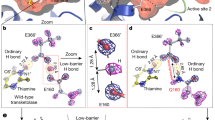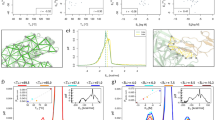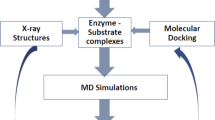Abstract
WATER molecules influence molecular interactions in all biological systems, yet it is extremely difficult to understand their effects in precise atomic detail. Here we present evidence, based on highly refined atomic structures of the complexes of the L-arabinose-binding protein with L-arabinose, D-fucose and D-galactose, that bound water molecules, coupled with localized conformational changes, can govern substrate specificity and affinity. The atoms common to the three sugars are identically positioned in the binding site and the same nine strong hydrogen bonds are formed in all three complexes. Two hydrogen-bonded water molecules in the site contribute further to tight binding of L-arabinose but create an unfavourable interaction with the methyl group of D-fucose. Equally tight binding of D-galactose is attained by the replacement of one of the hydrogen-bonded water molecules by its –CH2OH group, coordinated with localized structural changes which include a shift and redirection of the hydrogen-bonding interactions of the other water molecule. These observations illustrate how ordered water molecules can contribute directly to the properties of proteins by influencing their interaction with ligands.
This is a preview of subscription content, access via your institution
Access options
Subscribe to this journal
Receive 51 print issues and online access
$199.00 per year
only $3.90 per issue
Buy this article
- Purchase on Springer Link
- Instant access to full article PDF
Prices may be subject to local taxes which are calculated during checkout
Similar content being viewed by others
References
Miller, D. M., Olson, J. S., Pflugrath, J. W. & Quiocho, F. A. J. biol. Chem. 258, 13665–13672 (1983).
Clark, A. F., Gerken, T. A. & Hogg, R. W. Biochemistry 21, 2227–2233 (1982).
Fukada, H., Sturtevant, J. M. & Quiocho, F. A. J. biol. Chem. 258, 13193–13198 (1983).
Quiocho, F. A. & Vyas, N. K. Nature 310, 381–386 (1984).
Vyas, N. K., Vyas, M. N. & Quiocho, F. A. Science 242, 1290–1295 (1988).
Quiocho, F. A. Curr. Topics Micro. Immun. 139, 136–148 (1988).
Jacobson, B. L. & Quiocho, F. A. J. molec. Biol. 204, 783–787 (1988).
Quiocho, F. A. Pure appl. Chem., 61, 1293–1306 (1989).
Richards, F. M. A. Rev. biophys. Bioeng. 6, 151–176 (1977).
Quiocho, F. A., Philips, G. N. Jr, Parsons, R. G. & Hogg, R. W. J. molec. Biol. 86, 491–493 (1974).
Hendrickson, W. A. Meth. Enzym. 115, 252–270 (1985).
Author information
Authors and Affiliations
Rights and permissions
About this article
Cite this article
Quiocho, F., Wilson, D. & Vyas, N. Substrate specificity and affinity of a protein modulated by bound water molecules. Nature 340, 404–407 (1989). https://doi.org/10.1038/340404a0
Received:
Accepted:
Issue Date:
DOI: https://doi.org/10.1038/340404a0
This article is cited by
-
The role of hydration effects in 5-fluorouridine binding to SOD1: insight from a new 3D-RISM-KH based protocol for including structural water in docking simulations
Journal of Computer-Aided Molecular Design (2019)
-
Affinity improvement of a therapeutic antibody to methamphetamine and amphetamine through structure-based antibody engineering
Scientific Reports (2014)
-
A supramolecular copper(II) compound with double bridging water ligands: synthesis, crystal structure, spectroscopy, thermal analysis, and magnetism
Transition Metal Chemistry (2013)
-
RNA’s coming of age as a drug target
Journal of Inclusion Phenomena and Macrocyclic Chemistry (2009)
-
Synthesis, crystal structure and electrochemical behavior of supramolecular complex [4, 4′-bipyH2][4, 4′-bipyH]2.5(P2Wl8O62)[4, 4′-bipyH1.5] · 2H2O
Journal of Inclusion Phenomena and Macrocyclic Chemistry (2008)
Comments
By submitting a comment you agree to abide by our Terms and Community Guidelines. If you find something abusive or that does not comply with our terms or guidelines please flag it as inappropriate.



